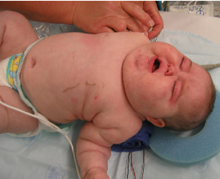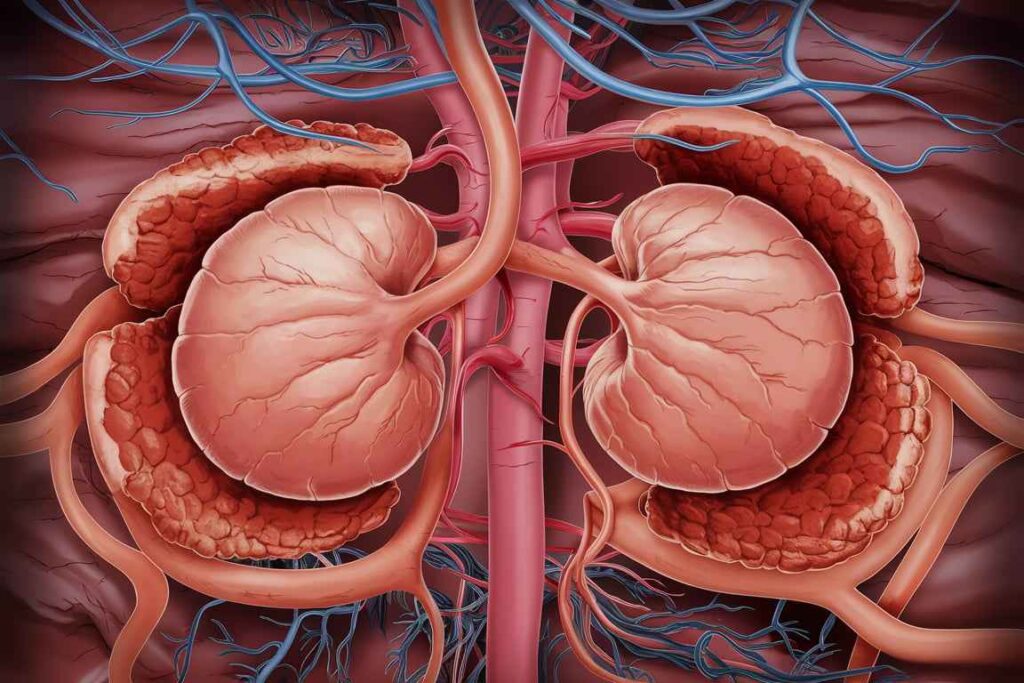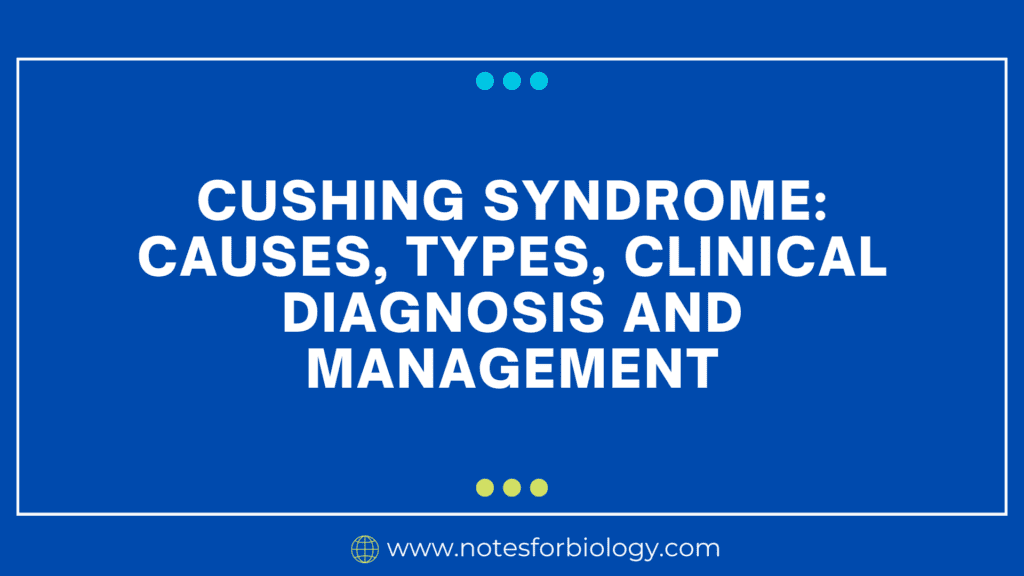Cushing’s syndrome is a hormonal condition induced by chronic exposure to elevated cortisol levels. It can be caused by a variety of situations that enhance cortisol production, as well as the use of exogenous glucocorticoids.
Table of Contents
What is Cushing syndrome?
Cushing’s syndrome is a condition induced by chronic exposure of the body’s tissues to high quantities of the hormone cortisol. It can be caused by glucocorticoid use or by cortisol-producing tumors or adrenocorticotropic hormone (ACTH), which promotes cortisol production.
Feature of Cushing syndrome including a round face, acne, reddish skin

Causes of Cushing syndrome
Exogenous (iatrogenic) Cushing’s Syndrome:
- Glucocorticoid drugs: Chronic use of corticosteroid drugs (e.g., prednisone) to treat illnesses such as asthma, rheumatoid arthritis, and lupus.
Endogenous Cushing’s Syndrome:

- Pituitary Adenoma (Cushing’s Disease) is a benign tumor of the pituitary gland that secretes an excess of adrenocorticotropic hormone (ACTH), boosting adrenal gland cortisol production.
- Ectopic ACTH Syndrome occurs when non-pituitary malignancies (such as small cell lung cancer) generate ACTH.
- Adrenal Tumors: Adrenal adenomas or carcinomas create excess cortisol in the absence of ACTH.
Types Cushing syndrome
ACTH-dependent Cushing Syndrome:
- Cushing Disease is caused by a pituitary adenoma.
- Ectopic ACTH Syndrome refers to the release of ACTH by non-pituitary malignancies.
ACTH-independent Cushing’ Syndrome:
- Adrenal Adenoma/Carcinoma: A tumor in the adrenal gland that produces too much cortisol.
- Primary Pigmented Nodular Adrenocortical Disorder (PPNAD): A rare adrenal gland condition.
- McCune-Albright Syndrome is a genetic condition that affects bones, skin, and the endocrine system.
Clinical Diagnosis

Clinical presentation:
- Weight gain: Obesity in the center, moon face, and buffalo hump.
- Skin changes include thinning, easy bruising, and purple striae (stretch marks).
- Musculoskeletal: Muscle weakness; osteoporosis.
- Metabolic conditions include hypertension, glucose intolerance, and diabetes.
- Reproductive issues include irregular menstruation and hirsutism (excess hair growth) in women.
- Neuropsychiatric symptoms include mood swings, sadness, and cognitive abnormalities.
Diagnostic Tests:
- The 24-Hour Urinary Free Cortisol Test measures cortisol excretion in urine.
- The Late-Night Salivary Cortisol Test measures cortisol levels in saliva late at night.
- The Low-Dose Dexamethasone Suppression Test measures cortisol levels following dexamethasone injection.
- ACTH Levels: Indicates if Cushing’s syndrome is ACTH-dependent or independent.
Imaging Studies:
- MRI of the Pituitary Gland: Used to detect pituitary adenomas.
- Adrenal CT or MRI: Used to detect adrenal tumors.
- Chest and abdominal imaging are used to discover ectopic ACTH-producing tumors.
Management
1. Treatment of Underlying Cause:
Pituitary Adenomas (Cushing’s Disease):
- Surgery: Transsphenoidal removal of the pituitary tumor.
- Radiation Therapy: For residual or recurrent tumors.
- Medications: To control cortisol production (e.g., ketoconazole, metyrapone).
Ectopic ACTH Syndrome:
- Surgery: To remove the ACTH-secreting tumor.
- Medical Therapy: To control cortisol levels if surgery is not feasible.
Adrenal Tumors:
- Surgery: Adrenalectomy to remove adrenal adenomas or carcinomas.
- Medications: Mitotane for adrenal carcinoma.
2. Medical Management for Hypercortisolism:
- Medications: Ketoconazole, metyrapone, mitotane, mifepristone to reduce cortisol production or block its effects.
3. Management of Complications:
- Osteoporosis treatment includes calcium and vitamin D supplements, as well as bisphosphonates.
- Antihypertensive medicines.
- Diabetes involves monitoring blood glucose levels and using drugs to regulate them.
Monitoring and Follow-up:
- Regular follow-up appointments to check cortisol levels, manage problems, and alter treatment as needed.
- Psychological support and counseling can help with mood swings, sadness, and other mental health disorders.
Frequently Asked Question (FAQ)
What is Cushing syndrome?
Cushing syndrome is a condition induced by chronic exposure of the body’s tissues to high quantities of the hormone cortisol. It can be caused by glucocorticoid use or by cortisol-producing tumors or adrenocorticotropic hormone (ACTH), which promotes cortisol production.
What are the types of Cushing syndrome?
The types of Cushing syndrome are:
1. ACTH-dependent Cushing Syndrome
2. ACTH-independent Cushing Syndrome
Related Article
Bergey’s Manual of Systematic Bacteriology and Determinative Bacteriology

